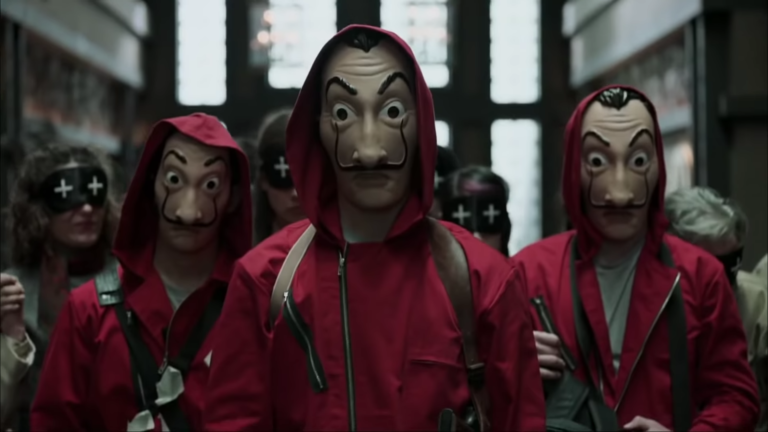‘Money Heist’ – is it progressive?
‘Money Heist’, “La Casa de Papel” in its original version, is a famous series produced in Spain by Atresmedia. Acquired by Netflix, it has become a global phenomenon.
Long story short, it follows the story of two robberies in the Bank of Spain and the national money factory, respectively. The fascinating aspect of it is how each plan is carefully orquestrated by the leader, ‘El Profesor’, and they manage to get out of very difficult situation. However, it is even more fascinating the stories that the robbers and the hostages live inside each of the buildings; including elements of thriller, romance and even war films.

Let's go to the point
There are many reviews of the plot, its positive critiques and also its plotholes, but here we are focusing on the values that the series may/ may not have, represented in many elements.
Portrayal of empowered women
Yes, that is one good aspect of the show.
We are starting with the talk about women representation and feminism, and it is important to mention the fact that the feminine characters in the show appear, generally, as empowered.
We are talking, more specifically, about the characters named Tokio and Nairobi, from the robbers group, and Raquel/Lisboa and Alicia Sierra from the police group. Other female characters like Monica have a certain development alongside the series, starting in an inferior position and gaining confidence and power during the story. But the former list of female characters are already in this state when the series begins.
This is good because they are seen as how women should think in terms of feminism, leadership and power. On the other hand, though, in reality this is not the common situation, unfortunately, so the series do not display a clear example of journey or process of empowerment. It does show, though, how these female characters clash with empowered male characters like Berlin, resulting in a political discourse of patriarchal – emancipation.
Nevertheless, the whole group of robbers has a man as a leader, as the smartest guy in the series. We can see how his method to gain Raquel’s trust is through seduction and romance. This may not seem like a problematic fact, but look at it this way: the robbers, lead by one male mastermind, and managed by other male ‘commanders’ (Berlin and then Palermo) inside the buildings they are robbing. And yes, the leader of the police department is a female character, but the plan ends up relying on the seduction of this character.
Representation
Yes, representation of colectives, ethincal groups, etc.
Let’s take a look at the ethnography of Spain, the country where the series is produced and set. We would see a considerable percentage of people with Arabic heritage, and also Rumanian. Some of them are foreigners but others are born in Spain.
Let’s take a look at the series ‘Money Heist’.
Ironically, there are no Arabic people among the characters, but there are two Serbian soldiers. Being the only ones that are not inserted in a ‘white Spanish etnicity’, the show lacks representation of other ethnic groups that live in Spain. Other famous series like Elite do have this representation.
It is important to clarify: that fact does not mean the series is not good, but it is something that people should be aware of when watching a show like that set in Spain.
And yes, also representation within LGTBI. In the first seasons, there was a certain lack of people within this collective. The only display of it appeared in a scene where Tokio kisses one of the female hostages, in a vulnerable moment for her, and of course it inserted the practice as something wrong and taboo, not at all in the romance that characterised other scenes.
Nevertheless, from season 3 on the series made an effort to include LGTBI characters. For instance, it is revealed that Helsinki is gay, and also Palermo, a new member of the group. They build a whole romantic story, kind of bitter, surrounding Palermo, which is good because it shows that he is not gay only to satisfy the demand for representation, but there is a relevant story behind.
Moreover, Manila, another new member of the group, appears to be a transsexual character, fact that is emphasized with the reaction of her old colleagues when they see her appearance. In this case, it is good that there is representation of transsexual people but there is no construction of awareness of the political discourses and tensions surrounding the topic of LGTBI. That is ok; after all, the series is not “about LGBTI”.
Moral
